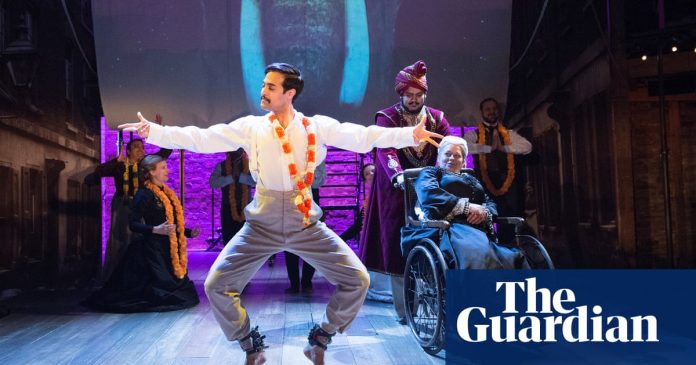The Empress by Tanika Gupta among new additions in attempt to diversify AQA’s offering for drama students in England
Drama students will have the opportunity to study a more diverse curriculum at GCSE and A-level with the addition of four new plays by writers of colour.
AQA, the biggest examination board in England, says the texts are part of a range of measures to update and revise its qualifications to ensure they better reflect the diversity of students and their teachers.
The new plays at GCSE level will include a thriller by Francis Turnly which is based on the true story of Japanese citizens who were abducted by the North Korean regime in the 1970s and 80s.
The Empress by Tanika Gupta, which tells the story of Queen Victoria’s relationship with her servant Abdul Karim and an Indian nanny called Rani Das, will also be added to the GCSE curriculum.
The new A-level texts include a reworking of Chekhov’s Three sisters by Inua Ellams, located in 1960s Nigeria, and Danai Gurira’s The Convert, which tells the story of a young Shona girl who flees an arranged marriage by converting to Christianity.
The exam board’s GCSE drama qualification already includes the well-known stage adaptation of Malorie Blackman’s Noughts and Crosses, which reverses traditional racial stereotypes and shows racial prejudice from a different perspective.
The texts will be available to study from September, with examinations taking place two years later. AQA is scheduling free online training events to give teachers a practical toolkit to prepare for and teach the new texts.
The exam board will also provide information about the social and historical backgrounds of each text, and cover topics such as stereotypes, accents and casting. It will also look at how to teach texts currently on the curriculum, with a focus on equality, diversity and inclusion.
Sandra Allan, AQA’s head of curriculum for creative arts, said: “We’ve chosen these plays because of the rich opportunities they’ll offer our teachers and students to explore a diverse range of themes including race and social issues.
“However, we know that just adding new plays won’t bring about greater diversity in the curriculum by itself, so we can’t stop there. We need to make it as easy as possible for schools to start teaching these plays.
“That’s why we’re providing lots of new support and resources and we really hope teachers and students will enjoy these new additions to our drama qualifications.”
AQA is not alone in updating its curriculum. Last year the OCR exam board introduced a range of new works including the 2019 Booker prize-winning novel Girl, Woman, Other by Bernardine Evaristo to its GCSE and A-level English literature courses.
If follows criticism that the curriculum in England is not sufficiently inclusive and needs to adapt to better reflect modern society. Research by the education charity Teach First, published in 2020, found that pupils could complete their GCSEs and leave secondary school in England without studying a novel or play by a non-white author.
The Great Wave by Francis Turnly shines a spotlight on the abduction by North Korea of young Japanese citizens. Spanning 1979 to 2003, the play covers the mysterious disappearance of 17-year-old Japanese schoolgirl Hanako. It echoes the real life experience of Megumi Yokota, who was just 13 when she was abducted by a North Korean agent in 1977.
The Empress by Tanika Gupta begins in 1887 when Rani Das and Abdul Karim arrive at London’s Tilbury Docks from India. The play covers the true story of Queen Victoria’s relationship with her servant and Hindi teacher, Karim, as well as the experiences of Indian ayahs like Das who came to Britain during the 19th century and were treated like second-class citizens.
The Convert by Danai Gurira is the story of a young Shona girl called Jekesai who escapes an arranged marriage by converting to Christianity and becoming a servant and student to an African Evangelical. Inspired by George Bernard Shaw’s Pygmalion, the play by the American-Zimbabwean dramatist considers questions of racial, political and religious identity and assimilation, exploring the cultural and religious collisions caused by British colonialism.
Three Sisters by Inua Ellams sees Chekhov’s iconic characters relocated from provincial Russia to 1960s Owerri in Nigeria where the country is on the brink of the Nigerian civil war, a conflict which saw the eastern region of Nigeria temporarily declared a new republic called Biafra. The Guardian’s Michael Billington described the play as a “startlingly vivid account of the civil war and a direct assault on British neocolonialism”.






